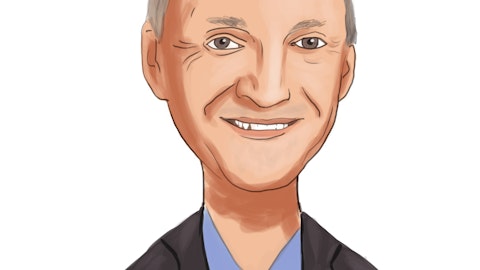Computer Programs and Systems, Inc. (NASDAQ:CPSI) Q4 2023 Earnings Call Transcript February 29, 2024
Computer Programs and Systems, Inc. beats earnings expectations. Reported EPS is $0.36, expectations were $0.34. CPSI isn’t one of the 30 most popular stocks among hedge funds at the end of the third quarter (see the details here).
Operator: Greetings, and welcome to the CPSI Fourth Quarter Earnings Conference Call. At this time, all participants are in a listen-only mode. A brief question-and-answer session will follow the formal presentation. [Operator Instructions]. As a reminder, this conference is being recorded. It is now my pleasure to introduce your host, Dru Anderson. Thank you. You may begin.
Dru Anderson: Thank you. Good afternoon, and welcome to the CPSI fourth quarter and 2023 earnings conference call. Leading today’s call are Chris Fowler, President and Chief Executive Officer; and Vinay Bassi, Chief Financial Officer. This call may include statements regarding future operating plans, expectations and performance that constitute forward-looking statements made pursuant to the safe harbor provisions of the Private Securities Litigation Reform Act of 1995. The company cautions you that any such forward-looking statements only reflect management expectations and predictions based upon currently available information and are not guarantees of future results or performance. Actual results might differ materially from those expressed or implied by such forward-looking statements as a result of known and unknown risks, uncertainties and other factors, including those described in public releases and reports filed with the Securities and Exchange Commission including, but not limited to, the most recent annual report on Form 10-K.
The company also cautions investors that the forward-looking information provided in this call represents their outlook only as of this date, and they undertake no obligation to update or revise any forward-looking statements to reflect events or developments after the date of this call. At this time, I will now turn the call over to Mr. Chris Fowler, President and Chief Executive Officer. Please go ahead, sir.
Chris Fowler: Thanks, Dru, and thank you to everyone for joining us this afternoon. I want to start off today’s call by saying how excited I am about our recently announced rebranding. We are coming together behind our TruBridge brand to simplify the way we do business and reinforce our commitment to delivering a comprehensive suite of financial and clinical solutions for our clients and the communities they serve. We believe this new brand more accurately reflects the evolution of the company and more closely defines who we are today and the opportunity ahead of us. We remain committed to delivering high-quality service to all of our clients regardless of the solutions they are using. On Monday, March the 4th, we will officially transition to TruBridge, when our common stock will begin trading on the NASDAQ stock market under our new ticker symbol, TBRG.
With that in mind, we will refer to our company as CPSI on the call today. Taking a look back, 2023 saw ups and downs throughout the course of the year, but we finished on strong footing with meaningful bookings and solid fourth quarter results. Today, I’ll touch on some financial highlights, provide updates on our ongoing initiatives and introduce our new CFO, Vinay Bassi, to dive deeper into the numbers and share our initial outlook for the first quarter and full-year 2024. Let’s start with a quick overview of 2023 results. For the full-year, revenue came in at $339 million, and adjusted EBITDA came in at $48 million. For fourth quarter bookings, we signed $26 million, which represents a sequential increase from $16.2 million in the previous quarter and was driven by meaningful increases in both RCM and EHR.
Fourth quarter 2023 bookings were up by 5.5% from fourth quarter of 2022 driven by RCM bookings, which increased 5.9%. We believe the pickup in RCM bookings was driven by several factors. First, the local labor market for our community hospitals is seldom expansive enough to meet all of their needs. Second, RCM is very complex and getting more so by the day. And third, the stigma of outsourcing billing efforts is diminishing as the problems of poor cash collections and increasing accounts receivables continue to weigh on community hospitals. Now taking a step back from the numbers, I’d like to shift to a few updates on the strategic moves we made over the past few months. First, in January, we announced our divestiture of American HealthTech, also known as AHT, to PointClickCare.
We believe that this was the best decision for both existing AHT customers and for CPSI. This divestiture allows us to focus more acutely on our core market of small to midsized hospitals, while ensuring our AHT customers are in good hands with PointClickCare, given their high level of service and exclusive focus on delivering EHR solutions to the post-acute care market. As part of the agreement, we will be PCC’s exclusive partner for complete business office services. We are not including anything at this time materially in our forecast as the post-acute market is lagging behind the acute care market in terms of converting to the outsourced model. Second, our integration of Viewgol is progressing as expected. As a reminder, early in the fourth quarter, we acquired Viewgol with the aim of bringing our globalized workforce in-house rather than continuing to rely on third-party outsourcing.
We split the initial integration plan into two tracks: one, getting our offshore resources to scale for existing customers; and two, bringing on the new customers. For existing customers, we went account-by-account to map out a plan for the ramp. And for our new customers, we are planning to staff them with the appropriate mix from the initial go live. It’s important to note that as we ramp up our global capacity over the course of 2024, we will likely experience a little margin pressure early on, but we expect that to reverse as the year progresses. Longer term, our goal is to achieve a workforce comprised of 70% offshore and 30% U.S.-based employees. While we work through this transition, it remains a top priority to remain — to maintain the same quality of service for all of our customers.
As we look forward into 2024, our entire organization is committed to returning to growth and realizing the operational leverage that our global workforce can achieve. We believe that our dedication to embracing technology and modernizing our infrastructure is key to our ability to consistently deliver best-in-class solutions to our customers. This is exactly why we continue to use AI to automate the RCM process wherever possible and utilize the cloud to improve capabilities and enhance our services. This commitment to leveraging technology has and will continue to be a top priority within our organization. As we’ve acknowledged in the past, we are in the midst of a transformation. 2023 was focused primarily on our people and ensuring we have the right team in place to take advantage of the growth opportunities for this year and beyond.
In 2024, while we’ll still continue to invest in our people, our focus will be on capital allocation. For example, making sure our investments in technology have a sharp focus on ROI to ensure our investments closely align with our strategic aims. With that, I’m very excited to hand it over to our new CFO, Vinay Bassi. Vinay brings a skill set that is already proving to be a huge asset to our organization. His extensive experience across the board — he has extensive experience across the board, but particularly in offshore operations and has been and will continue to be extremely beneficial to our team during this transformational time. Vinay, can you take us through the numbers?
Vinay Bassi: Thank you, Chris, for the introduction. Before I review our fourth quarter results and our initial 2024 outlook, I want to share with you all a bit about why I joined CPSI. Most of my working years have been focused in technology and services, primarily telecom communications at Avaya and media at Nielsen. CPSI is an extension of that journey where I’m excited to join the company operating in health care technology and services. During the interview process, I was impressed with Chris and his commitment to transform the company. I was fully aware of the missteps in 2023 performance, but the company’s strong mode of RCM growth within the EHR customer base, coupled with strategic acquisitions and divestitures, reinforce my confidence that the team is focused on transforming the company.
My own experience in building a strong team, enforcing fiscal discipline and leading with a data-driven approach were at the forefront of my decision to join CPSI to be part of its next chapter. Some of my areas of focus for the near term include: First, getting a thorough understanding of the key business drivers that serve as a leading indicator for forecasting, including bookings conversion and increasing trajectory of offshore resources, while meeting customer service level agreements. Second, building a strong finance team built on principle of a fact-based, forward-looking approach and closely linked with the business. I believe this will help in improving forecasting and fiscal discipline going forward. Third, taking a fresh look at capital allocation and CapEx with a return on investment mindset.

We have invested in many projects to date, and we will be reviewing those efforts to prioritize the ones that will benefit us near term. Fourth, continuing the cost optimization initiatives that directly impact EBITDA. And last, ensuring the successful integration of Viewgol. Now let’s jump into the numbers. Total bookings in the quarter came in at $26 million, RCM bookings at $14.2 million, made up about 54% of the total, which represents an increase of 5.9% from 2022. Total revenue for the fourth quarter of $85.9 million compared to $83.2 million a year ago. RCM comprised 59% of the total revenue and crossed the $50 million threshold for the first time. Let me provide additional color on revenue. Viewgol contributed approximately $3.8 million in about two and a half months in Q4.
Further, RCM excluding Viewgol, showed growth of 3.3% compared to Q4 ’22. EHR showed a decline, primarily due to the impact of sunsetting the Centric platform. In the quarter, we reported cost of revenue of $43.7 million, which yielded a gross margin of 49.1% compared to 46.5% a year ago. The improvement in margins came primarily from savings associated with our voluntary employment retirement program and lower bonus accruals due to the 2023 performance. In the fourth quarter, reporting — reported operating expenses, excluding goodwill and trademark impairment as a percent of total revenue was 53.2% compared to 41.4% a year ago. The increase of primarily from severance expense and other one-time items, including fees incurred for M&A activities.
On an apples-to-apples basis, excluding these one-time items, operating expense as a percent of revenue would have been 45.2%, driven primarily by Viewgol and increased investments in sales and marketing technology, including the cloud migration as well as aging receivables. With all that taken into consideration, adjusted EBITDA for the quarter came out to $12 million compared to $13.2 million a year ago. Adjusted EBITDA margin of 14% in the quarter decreased 190 basis points over year due to the impact from increased investments in sales and marketing, cloud, some Microsoft licenses and technology resources for future growth, and was partially offset by the benefit from our savings associated with our voluntary employment retirement program and lower bonus accrual in 2023.
We ended the year with a cash balance of $3.8 million and a net debt of $194.5 million. Operating cash flow for the year was $1 million versus $32.4 million in 2022. The reason for decline was primarily a result of lower adjusted EBITDA, higher interest expense from funding the Viewgol acquisition, severance and other onetime items. Lastly, in connection with the company’s disposition of AHT in January 2024 and other factors, management is finalizing certain line items in the financial statements primarily related to the amount of goodwill impairment and the final numbers will be included in our 10-K filing. Moving on to our guidance. First, in an effort to improve our transparency, we will begin providing guidance for the upcoming quarter starting today.
For the first quarter, we expect revenue to be in the range of $82 million to $84 million. Adjusted EBITDA to be between $8.5 million to $9.5 [Technical Difficulty].
Operator: It appears that we are just experiencing some technical difficulties. One second. Ladies and gentlemen, please standby. The conference will resume momentarily. We thank you for your patience. Ladies and gentlemen, we thank you for patience. Our event will now resume.
Chris Fowler: Yes. This is Chris. We’re going to go back to Vinay starting at the beginning of guidance. So we just wanted to make sure that we went ahead and put him straight into the fire. So here we go.
Vinay Bassi: Thank you. Moving to our guidance. First, in an effort to improve our transparency, we will begin providing guidance for the upcoming quarter starting today. For the first quarter, we expect revenue to be in the range of $82 million to $84 million, adjusted EBITDA to be between $8.5 million and $9.5 million. And for the full-year 2024, we expect revenue of $340 million to $350 million, adjusted EBITDA to be $45 million to $50 million. I want to give you a little insight into our thought process and assumptions that went into this year’s guidance. Firstly, we have assumed impact of AHT in the guidance. In other words, the guidance assumes only 15 days of AHT in Q1. As a point of reference, AHT accounted for approximately $16 million in revenue in 2023 with approximately $2 million of contribution to adjusted EBITDA.
Secondly, a full-year of Viewgol is included in these numbers. For 2024, we expect revenue of less than $20 million with an approximately $4.5 million contribution to adjusted EBITDA. Starting with bookings. We took a conservative approach for the full-year and assume 2024 will be relatively flat compared to last year, excluding AHT and Viewgol. In terms of quarterly cadence, we expect the first quarter to be the lowest of the year and then build as the year progresses. That said, please keep in mind that bookings are lumpy. The midpoint of our annual revenue ranges implies 6.5% growth excluding ASP from 2023, and that will be primarily driven by organic growth in our RCM business and the full-year contribution from Viewgol. Last year, RCM, including Viewgol, in Q4 accounted for 57% of our total revenue, and this year, we think could be about two-thirds of total revenue.
We are forecasting our EHR business to be relatively flat, excluding the impact from sunsetting of our Centric platform. I also want to provide further detail on how we anticipate EBITDA margins to progress over the year. The first quarter will be our lowest EBITDA margin in 2024 at approximately 11% based on the midpoint of our quarterly guidance range. This is because we have just begun ramping our global workforce and therefore, have some duplicated costs during the initial transition to ensure continuity for our existing customers. We expect the second half to have higher EBITDA margins to reflect the benefits from already negotiated vendor savings, savings from ramping the offshore workforce and expected first half bookings converting to revenue.
I have been conservative to not include any other future cost savings, book initiatives in our guidance that we have initiated as part of cost rationalization and capital allocation strategy. These initiatives are in the preliminary stages, but include a review of overall cost structure relating to vendor spend, G&A, including real estate and CapEx spend. We could see benefits in the second half, but there are too many moving parts as it relates to the contribution from the offshore transition, along with other factors to count them in the financials for now. I’d like to close out my first call by thanking Chris and the rest of the CPSI team for a warm welcome to the company and a great first couple of months. I’m excited to help CPSI successfully capitalize on the many opportunities that lie ahead of us, and I look forward to getting to know many of you in the coming weeks and months and keeping you updated on our progress as the year unfolds.
With that, I will open the call up to questions.
See also 20 Best Warm Liberal Places to Retire and 16 Best Cities for Retirees in the Pacific Northwest.
Q&A Session
Follow Trubridge Inc. (NASDAQ:TBRG)
Follow Trubridge Inc. (NASDAQ:TBRG)
Receive real-time insider trading and news alerts
Operator: Thank you. We will now be conducting a question-and-answer session. [Operator Instructions]. Our first question comes from Jeff Garro with Stephens, Inc. Please proceed with your question.
Jeff Garro: Yes, Good afternoon. Thanks for taking the questions. And welcome to the call, Vinay. Wanted to ask about margins in 2024. Would expect Viewgol and further offshore leverage as well as essentially some reduced R&D following the post-acute divestiture to be accretive to margins? So could you discuss those in some more detail and also any potential offsets the heavy landing at those roughly flat EBITDA margins at the midpoint of the guidance year-over-year? Thanks.
Vinay Bassi: Thank you, Jeff. First of all, I’m excited and looking forward to building this relationship with all of you. You’re absolutely right. It looks like a flat margin and all the reasons you outlined are also factored in. But there are a big — a couple of big offsets that I would highlight. One is, our budget for ’24 will be based at full bonus. So compensation-related expense adds a significant portion, and this compensation is bonus accrual as well as merit increase. That offsets most of these gains right now. And barring that then, obviously, we had smaller increases from the full-time impact of the hirings that we had done in the second half of ’23 full-year impact is felt in ’24. So these are investments in support, technology, and sales and marketing.
Jeff Garro: Got it, Vinay. That helps. And you step back a bit and throw it out there for Chris. You’ve done the Viewgol acquisition, you’ve divested the post-acute business. Curious if we should think about potential for additional strategic moves to come? Or do you now have the platform that you want to grow and drive leverage across?
Chris Fowler: I think it’s a super fair question. And I would say, right now, for 2024, we’ve got a full plate and we’re looking to execute. And so we were excited about obviously, getting the Viewgol deal done at the end of last year, excited about the AHT divestiture, creating the additional focus there. And right now, top of mind for us is continuing to drive sales and revenue growth and really capturing the value of the Viewgol workforce transformation over the course of this year. And going back to that margin question. You can look at — I’m excited about the fact that we’re providing the quarterly look ahead guidance, which allows a bit more visibility for you guys as we’re continuing to march through this transformation. But you can also tell just from the bridge of looking at Q1 over the course of the year, there’s a pretty steady ramp as that margin grows as we continue to execute on the offshore workforce.
Jeff Garro: Excellent. I appreciate that. One last one for me before I jump back in the queue. But I want to make sure we hit bookings and saw the nice finish to the year. Could you help us think about the pipeline from here? And where our expectations should be for bookings in 2024?
Chris Fowler: Yes. We were definitely thrilled to see the rebound that we had in Q4 over Q3. We continue to remain cautiously optimistic. I think the trap we fell into last year, Jeff, was getting a little over our skis with, and I know we’ve talked about this throughout the year, of how quickly this market was going to unlock. So if you look at our guidance, I think that we’ve taken a very measured approach at how the bookings contribution has impact over the course of the year. With that said, the pipeline continues to be strong. We’re continuing to have the same great conversations with customers and seeing those pick up both in our existing customer base and with our outside of the EHR.
Jeff Garro: Great. Thanks again for taking the questions. I’ll hop back in the queue.
Operator: Our next question comes from Sarah James with Cantor Fitzgerald. Please proceed with your question.
Sarah James: Thank you. I was hoping you could unpack the seasonality a little bit more. So the year looks like, especially on the EBITDA side, a little bit more back-end loaded. Are there any one-timers in there we should think about is the cost of rebranding in 1Q ’24 and how sizable is that?
Vinay Bassi: Yes. So that’s a great question, Sarah. Nice to meet you again. Sarah, the margins I give is adjusted EBITDA margins and rebranding and all our onetime items that are taken out. We have rebranding cost for this year, but it’s not included in the adjusted EBITDA margin. You’re right, the margin is back end loaded for two reasons. The ramping that Viewgol has is on a month-to-month basis. So if I had something in the first month, I get in the last quarter, all the benefits. So it’s a ramping up of month-by-month, so that my — fourth quarter will be the maximum benefit. That’s one. Secondly, my vendor savings that we have negotiated, it kicks in from Q2 onwards. So that’s the second aspect of it. And obviously, the bookings and the revenue that you expect is the benefits that we will see is also back end loaded.
So it’s a mix of all three. The good advantage part of it is vendor savings has already been negotiated. And the bookings of first half will give us a great color for the second half of revenues.
Sarah James: Great. Thank you, Vinay. And maybe you could give us a little bit of insight into your process there, how you’ve been going through the review of the business units and how you think about guidance philosophy, whether it’s conservative or optimistic?
Vinay Bassi: That’s a great question that you say. I’ve always been told future will tell me whether I was optimistic or conservative, but I’ll tell you how I have thought through these. As you know, Sarah, there are a lot of moving pieces, a lot of pieces that could change, but how I’ve thought through is looking at the past to be my — looking at history, and then looking at future and breaking into two parts, like what Chris said, one, being a little conservative on making sure what we learned of optimism of ’23 is not baked in to ’24. So a flat bookings number, excluding Viewgol and AHT was a good, especially despite coming good on the Q4, that was one. Second aspect on margins. Some of it is my history and my background, laser-focused on the controllable and making sure the rigor that we need, we have started putting on these expenses and everyone to fight to stay on that — on the P&L.




